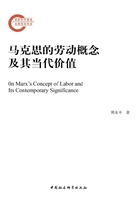
Preface
Labor, by which human civilization began, is one of the most complex and kernel ideas in Karl Marx's theoretical system.Incessant interpretations and reflections on the concept have been a unique theoretical landscape in the Marxist studies.Re-reflection on those interpretations and reflections will help us not only in further understanding the concept and the whole Marxist theoretical system, but also in manifesting the concept's contemporary significance.Taking Labor as the main thread, this paper systemically investigates the theoretical origins of the concept and its process and progression of formation, and then elaborates the connotations, structures and dimensions of the concept.On such basis, it makes commentary on the existent conventional interpretations of this Marxist concept and consequently launches critical debate against the queries and criticisms by some contemporary Western theorists.Finally, on basis of the said studies, it explores the significance of the concept in contemporary world.
Marx's concept of Labor was formulated after the labor theories of National Economics, of Utopian Socialism and of German Classical Philosophy, and to certain extent suggest the elements of Judaism and Christianity.National economists such as William Petty, Adam Smith and David Richardo regard labor as naturally rational activities which yield value and wealth.However, confined in their bourgeoisie stance and perspective, they see labor no more as a non-historical activity, in spite of their emphasis on it.The theories of labor proposed by utopian socialists like Comte de Saint -Simon, Charles Fourier and Robert Owen express proletariats'earlier desire to improve their working conditions.However, because of their unawareness that liberation of proletariat labor can only be investigated through the paradoxical movement of real capitalist mode of production, they failed to reveal the subjective forces in human liberation, which makes their expressions of la bor liberation something inevitably utopian.According to Hegel in Phenomenology of Spirits, labor is a negative action of object -refining, a deferred satisfaction of needs, and a key activity in which human subject affirms itself.Such labor is nothing but the dialectical movement of rationality.In Elements of the Philosophy of Right, Hegel regards labor as a means that mediates the demand system of civil society by which every one works for himself and at same time for others.This understanding reveals the positive effects of labor but neglects the negative, as a result of Hegel's stance in national economy.In Feuerbach, the concept of labor is principles of sensibility-objectivity.This understanding, which resorts to perceptual intuition and abandons man's dynamics, fells also into abstract mode.It was on overcoming the flaws of the earlier concepts that Marx achieved a breakthrough and innovation, to the extent of principles, in the concept of Labor.His repudiation of non-historical abstracts and emphasis of historicity fundamentally opens a way to understanding social realities and looking into the inter-human relationships under the disguise of inter-material relationship.In his Economic and Philosophical Manuscript of 1844, Marx uncovers the dominance of alienated labor on men and creates the concept of“objective activity”.In Theses On Feuerbach and German Ideology, Marx sublate Feuerbach's intuitive materialism with the concept of sensuous activity.He indicates real human and their activities as preconditions of history and brilliantly expounds the relationship between labor and labor division.In Capital and other of his manuscripts, in which commodity is taken as the logical start of labor study, Marx enunciates the ideas of two-fold labor, wage labor, productive labor and free labor, by which he completes his critique of politico-economy and reveals human's dominance by capital, or accumulated abstract labors.In Ethnological Notebook written in his late years, Marx reveals that an individual in the primary society tends to regard himself as an owner and a member of the community in works for obtaining existence necessities.
In terms of its connotations and orientation, Marx's labor is an activity of reification essential human powers and a sensuous objective activity.It is a concept of production by which human meets his own material needs(material exchange between human and nature), as well as a concept of life that characterizes human's existence.It is of three - dimensional structures: first, through labor nature is transformed, human is thus generated, and the natural realities turn into human ized nature;second, through labor inter-human relationship is formed and the society is increasingly formed; in other words, labor is materialization of human's social nature;third, through labor one creates himself, i.e.realizing his self-values and individualization.The realization of human freedom in labor depends on combination of the standards of man and of object.Therefore, genuinely humane labor is one in which man conducts free and conscious activities and is relieved from living-making constraints.In terms of its philosophical dimensions, Marx finds out“the key to understanding the whole social history”—historical materialism, thus resolving the“historical riddle”and testifying the end of“prehistory of mankind”.In the communist society in the future, labor is an activity which takes itself as its purpose, and will become the primary need in people's better life through which each one realizes his free and all-round development.
As a kernel point in Marx's theoretical innovations, the concept of Labor is indeed“well-known”.But“being well-known”means not“being known authentically”.There have been misreadings of the concept as“incipient thoughts”,“potivism”,“abstraction”or“out of date”, and also criticisms made by Western theorists that the concept is“essence of modern metaphysics of labor”,“private activity as result of man's physical necessity”,“activity of instrumental rationality”or“rational activity of productive value”.All those misunderstandings fail to reach the whole scope and total significance of the concept.In Marx's view, human existence lies in the process of their real life.As the most fundamental praxis, labor is ontologically significant as it creates not only human-nature but also human-human relationships.It as the abstracted nature of wealth becomes the equivalent for common exchanges in an operating modern society.Hence, in an existential perspective, Marx's concept of labor really exposes human existence.On basis of such understanding we can recognize the concept's significance in contemporary age:theoretically, it is an indispensible perspective from which we can scrutinze and analyze the conditions of capital-centered modernity and modern life;practically, it guides our efforts for promoting hamornious human-human and human-nature relationships and for realizing labor justice and ecological civilization progress.